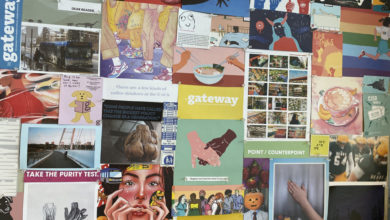Boooo to ghosting
 Jordan Jensen
Jordan JensenIf you’ve ever tried online dating apps like Tinder or Bumble, you’ve probably been ghosted before. You might have even ghosted someone yourself. While it can seem like an easy way to get rid of someone you’re less than interested in, it’s actually a significant problem, for individuals and for society.
Ghosting is when someone abruptly cuts off all communication with another person. No warning, no nothing. Suddenly, they’ve vanished, hence the term “ghosting.” It usually happens in a romantic context but friends have been known to ghost each other too.
I’ll be the first to admit that I’ve been ghosted before. In fact, I’ve been ghosted a few times and, as I can report firsthand, getting ghosted is really shitty. It leaves you feeling rejected and wondering what went wrong. It robs you of that needed closure. But as shitty as getting ghosted is, ghosting is way shittier when you look at it in a societal context. Ghosting is only a symptom of much larger problems: social isolation and what has been referred to as “the crisis of disconnection.”
To be fair, increasing disconnection and social isolation are nothing new. Emile Durkheim coined the term “anomie,” or the normlessness resulting from a breakdown of social bonds, way back in the 1890s. Increasing social isolation is documented as a consequence of industrialization and modernization. What has changed, however, is the technology and the role that technology plays in our lives. Modern tech, like smartphones and social media, has not only accelerated this historical process, but also transformed it. Modern tech is changing how we relate to and interact with each other as human beings.
One such way technology is changing our relationships is through what psychologists call the online disinhibition effect. Simply put, communicating with someone online doesn’t feel as real or genuine as communicating with them in real life. The person on the other side of the screen doesn’t feel real, and what follows is a loss of empathy. Accordingly, people are far more likely to treat each other poorly online, especially if they don’t know the other person and there are few consequences for their behaviour. This is why comment sections can get so nasty, and one of the reasons why ghosting happens.
Another reason is that modern tech, specifically online dating apps, give us far too much choice. At first, this sounds counterintuitive. Why would more choice be a bad thing? Aren’t I more likely to find the right person if I have more choices? However, all this extra choice does nothing but paralyze us with indecision. People become unable to make romantic decisions about others because, at some subconscious level, they believe someone even better might be right around the corner. Accordingly, people become far less likely to give others a fair shot and ghosting becomes an easy way out.
Ultimately, ghosting is not the easy escape hatch that some people seem to think it is. Not only is it harmful, but it’s symptomatic of the larger technological changes that are negatively transforming our society. While the tech itself is partly to blame, we as human beings also get to decide how we use this tech. We get to decide how we interact with each other, both online and offline, and so we should work to rise above this horrible trend. So to all those poor souls out there who have been ghosted, understand that it’s not you, it’s them. Well, it’s them, and their smartphone too.
This article was inspired by an episode of the podcast Note to Self. You can listen to it here.




